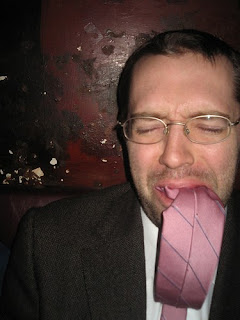Some questions:
1. We have a couple of trash bins at work that are used specifically for people to place documents that are to be shredded. It's my responsibility to empty these bins on a consistent basis. Something that drives me about as nuts as I can be driven is when someone tears up their paper into four or more pieces before dropping it into the bin. Are you freaking kidding me? It's going to be shredded, why in god's name would you ever think you need to tear it into pieces beforehand? It's stupid, it's inconsiderate, and above all, it's embarrassingly inefficient.
2. I was watching Seinfeld last night for the first time in a while and found myself laughing harder than normal. But something I never paid much attention to: why in the hell are they always driving places in that show?
3. Does anyone else agree with me that it's time we come up with some new words to describe familiar things? Ironic is a word that used to clearly communicate something specific, but it's been so heavily used in our culture that it's taken on a life of its own and doesn't often effectively communicate the idea that it's supposed to anymore. Maybe you could say something is slappy instead, so that slappy represents the actual dictionary definition of irony, whereas irony will then only represent the popular usage. Irony isn't the only or even the best example of this, of course. Pathetic or pitiful are two similar words. When people now hear that something is pitiful, they probably think of something bad or weak or shameful, while either missing entirely or only getting secondarily the simple true meaning of pitiful: something that inspires pity. It's a word that is more about empathy than judgment or condescension, but due to it's commonness, it has lost its specific meaning. When using pitiful, I find myself having to state that I mean it in the dictionary way, and to me that signifies that pitiful has stopped being an efficient and effective word.
Imagine that blue, in our culture, was a word that described not just what we now know as blue but more broadly the whole range of colors including purple, violet, and green, and that the words purple, violet, and green have become too obscure to have much meaning. In this scenario, we've lost effective descriptive words for purple, violet, and green, which is a lamentable thing, but we've also lost the word for blue, since blue has been bastardized into encompassing all of purple, violet, green, and blue. In this scenario, not only would we be wise to recover those words purple, violet, and green, but we'd also probably need to give up and scrap blue and come up with a new word for blue.
Basically, the more popular a word becomes, the less communicative it becomes. Kinda slappy, actually.
Subscribe to:
Post Comments (Atom)


No comments:
Post a Comment